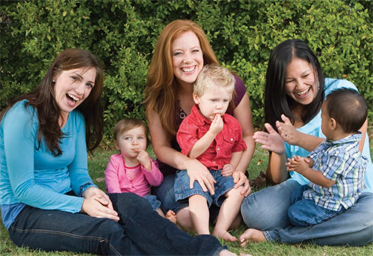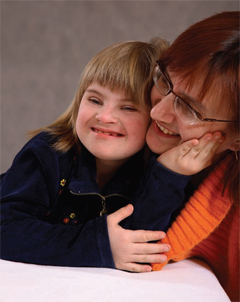For Parents of a Child with a Disability
My child has just been diagnosed with a disability. What do I do? + −
Meet with the person who did the assessment.  This can help you understand the disability and the next steps for your child. It helps to ask for the following information during the meeting:
This can help you understand the disability and the next steps for your child. It helps to ask for the following information during the meeting:
- Explanation of the assessment – Ask the specialist to explain the assessment. Get a clear explanation about your child's strengths and limitations, along with any recommendations.
- Copy of the assessment – Get a copy of the assessment report. This will give you valuable information. It will also be helpful when meeting with service providers.
- Ongoing contact or follow-up – Ask if you will have any further contact with the organization where the assessment took place. Ask if there will be a follow- up assessment.
- Referrals – Ask if referral(s) have been made to appropriate agencies or service providers.
- Resources – Ask for information about the disability and about agencies that provide information, support and programs.
What can I do to support my child with a disability after she's been diagnosed? + −
There are many ways you can support your child:
 Learn about the disability – You may want the pediatrician or specialist to tell the child about his disability. This meeting allows your child to ask questions. You can also research the disability and talk about the information with your child.
Learn about the disability – You may want the pediatrician or specialist to tell the child about his disability. This meeting allows your child to ask questions. You can also research the disability and talk about the information with your child. - Discuss equipment and devices – There may be specialized equipment that can enhance your child's developmental skills and help with everyday activities.
- Be positive – Take a positive approach toward the disability and your ideas about the possibilities for your child.
- Talk about strengths and weaknesses – Explain how all people, whether they have a disability or not, have things that they are good at and things they find harder to do. Share your own experiences with your child. Talk about how it is important for everyone to work on the areas they find difficult as well as develop their strengths.
- Connect with others – It can help to connect with other families who have children with similar disabilities. Ask your child's service providers about meeting other families who have a similar interest in making a connection.
- Find an organization – There are many organizations in the province that are dedicated to a specific disability. Some specialize in support for children with disabilities and their families.
- Take care of yourself – When you are first told about a diagnosis, it is normal to have an emotional response. Talk about your feelings and make sure to take good care of yourself – get enough sleep, eat healthy and exercise. You can care for others best if you take care of yourself.
Maintain a positive approach. Accept and believe in your child's abilities. Your response towards your child's disability can impact his or her self-esteem.
How can I encourage my child to become an effective self-advocate? + −
There are many ways that you can help your child gain the skills to let people know about his or her disability and accommodations that might be needed in certain situations.
- Use the name of the disability when talking with your child – She will not be labelled by knowing and using the correct name. Instead, using the correct name creates a starting point for letting people know what she may need in a certain situation.
- Help your child learn about his needs and how to express those needs – Talk with your child about ideas for managing various situations. You can also ask your child's doctor, specialists and teachers for ideas. For example, a child who is hard of hearing can explain that it is easier for him to understand what someone is saying when there is less noise and he can see people's faces. A child with Attention Deficit Hyperactivity Disorder (ADHD) can explain that it is difficult to concentrate when she sits close to the door and there are a lot of people passing by her desk.
- Show positive ways of asking for help or expressing a need – Children can learn effective ways of making requests by watching you. Examples of situations where you can show positive ways of making a request or expressing a need include:
- asking for directions
- asking for clarification when you have not understood something
- requesting an ingredient change at a restaurant
- Use home as a good starting ground – Encourage your child to let you know when she needs help or would like to try doing something by herself. Allow and encourage her to try new activities. Although it may take longer, or the results may not be perfect, your child is gaining confidence and independence. If necessary, break the task down into smaller parts.
- Practice in a safe, non-threatening environment – Give your child opportunities to practice what he will do in various situations. Your child can develop a plan for situations, such as:
- how to respond if someone asks about his disability
- how to ask for accommodations
- what to do when he does not understand an assignment at school
Advocacy is speaking in support of something, such as an idea, need or right. It can be for the purpose of increasing awareness or to change how things are done.
How can I help my child develop good relationships? + −
Learning how to socialize is a part of a child's development, just as speaking, movement and thinking are a part of development. While each child develops at a different rate, you can help your child increase their social skills.
- Have expectations – all children learn to interact appropriately by having guidance
- Talk about communication and interacting with others – Talk with your child about different situations that may happen in day to day interactions with others. Possible topics include how to meet new people, start a conversation and manage criticism or conflict.
- Talk about friendships – Discuss the qualities that are important to have in friends and how to be a good friend to others.
- Provide opportunities for interaction – Encourage your child to participate in activities that interest him. This will help him develop skills, confidence and new relationships. There are many organizations that provide a variety of activities for children, including community clubs, your child's school (extra-curricular programs), boy scouts, girl guides, YMCA and libraries.
- Work with your child's child care centre or school teacher – they can identify ways that your child can be a part of social groups.
Are there activities I can do with my child to promote development? + −
 If there are specialists who work with your child (ex: child development worker, occupational therapist or speech-language pathologist), they can provide activities for you to do with your child to help with specific developmental areas.
If there are specialists who work with your child (ex: child development worker, occupational therapist or speech-language pathologist), they can provide activities for you to do with your child to help with specific developmental areas.
There are many online sources that provide activities to promote development. The following website contains activities for your child at various developmental stages:
- http://www.children.gov.on.ca/htdocs/English/documents/topics/earlychildhood/understanding_child_development.pdf
- https://www.cdc.gov/parents/infants/index.html
For school age children, talk with the school team about activities you can do at home. For more information on your child's education and working with the school team, please see the Education section.
What is respite? Who provides respite? + −
 Respite is a brief break for caregivers, while children participate in positive, meaningful activities. It can be provided inside or outside of the child's home and helps provide balance in the life of parents.
Respite is a brief break for caregivers, while children participate in positive, meaningful activities. It can be provided inside or outside of the child's home and helps provide balance in the life of parents.
Respite can be provided through various agencies. If you do not qualify, or would like more time, there may be informal supports in your life that can provide an hour or two of respite. Informal supports include friends, extended family and neighbours. Faith-based organizations and non-profit organizations may also offer respite.
In Manitoba, there are various organizations that provide respite:
- Children's disABILITY Services – If your child receives services from Children's disABILITY Services, you may be eligible to receive respite. To contact the office in your area, visit:
- Community Respite Services – You can find more information and services from Community Respite Services:
- In Winnipeg
825 Sherbrook Street
Winnipeg, MB R3A 1M5
Phone: 204-953-2400
Email: michelle@communityrespite.ca - In Brandon
710 – 3rd Street
Brandon, MB R7A 3C8
Phone: 204-727-4910
Email: bdn_westman@communityrespite.ca
- In Winnipeg
- Home Care – Home Care may provide respite for parents of a child with a disability. For more information, visit:
Through respite, children experience new relationships and can try new activities that promote development.
Parenting a child with a disability may present additional challenges and require more time. Whether respite is used for rest and relaxation, exercise, running errands or quality time with a partner or other children, it gives caregivers greater balance in their lives.
How can I maintain a strong relationship with my partner? + −
 Raising a child with a disability may be challenging for a couple. That doesn't mean it will have a negative impact on your relationship. Some relationships may be strengthened, through increased communication, shared responsibilities and the development of coping skills. To maintain a strong bond, keep communication open and ensure that you spend time together. Try to minimize stress by:
Raising a child with a disability may be challenging for a couple. That doesn't mean it will have a negative impact on your relationship. Some relationships may be strengthened, through increased communication, shared responsibilities and the development of coping skills. To maintain a strong bond, keep communication open and ensure that you spend time together. Try to minimize stress by:
- Sharing responsibilities and workloads – Sharing the workload will balance the added responsibility both partners experience.
- Using your support network – It is difficult for one person to be someone's sole support. Include others in your support network, such as family members, disability associations, family counsellors and friends.
- Spending time together – There may be extra time needed to raise a child with a disability. Respite can provide time for just the two of you to enjoy recreation activities together, laugh and share ideas.
- Reducing financial stress – Apply for services and supports available for children with disabilities and their families.
What about my other children? + −
Through time and events, siblings of a child with a disability may experience a range of emotions. There are times when your child may feel that their brother or sister with a disability is receiving most of your attention, care and concern. At times, your child may feel sensitive or uncertain of how to deal with the reactions of others towards his or her sibling.

It is helpful to talk openly with your children about their sibling's disability in a reassuring way. Acknowledge their feelings and let them know that what they are experiencing is normal. Take time to talk with them when they need to connect with you.
- Encourage your children to ask questions and discuss their feelings. When answering questions, be positive and realistic. Provide information using simple language.
- Siblings may sometimes feel the child with a disability is given advantages and lenience (such as parents having greater tolerance, acceptance and understanding). Involve the children in deciding which tasks they will take on when developing rules and responsibilities. Make sure that they are ready for any tasks they receive and keep caregiving responsibilities to a minimum.
- Provide opportunities for the sibling to have time alone and time to develop his or her own hobbies and friendships.
- Having a sibling with a disability can increase a child's empathy, altruism (being unselfish and concerned about others), value for diversity and maturity.
- Try to develop a balance for siblings – opportunities to participate in family activities and time to develop their own hobbies, interests and friendships.
What kind of assistance and support is available for parents? + −
 There are many different options available for support. Parents can turn to both the natural supports that they have in their lives (ex: family and friends) and assistance available through organizations.
There are many different options available for support. Parents can turn to both the natural supports that they have in their lives (ex: family and friends) and assistance available through organizations.
Natural Supports
Families often have natural supports that can help with some of the additional needs that may come from having a child with a disability. Natural supports may include family members (spouse, parents, siblings), friends, neighbours and members of the faith community.
Your natural supports can help in many ways, such as taking your child on outings or coming over to your house to give you time to run errands. You can also arrange play dates and share the care and supervision of children. These arrangements will provide time for you to recharge and take care of necessary tasks.
Community and Agency Supports Assistance
Assistance that is available to parents through organizations varies across Manitoba. Depending on each family's situation, there are a range of supports that parents may find valuable, such as:
- connecting with other parents who have a child with a disability
- accessing respite services
- attending support groups
- attending parenting classes
- participating in individual or family counselling
How can I connect with community and agency supports for parents? + −
The specialists who are involved with your child can connect you with helpful programs. Talk with service providers about possibilities in your community. If your child receives services from Children's disABILITY Services, contact your Family Services Worker. Your worker will talk with you about the sources of challenge or stress. Based on these causes, he or she will link you with appropriate supports. Please see the following website to contact the Children's disABILITY Services office in your area:
The Volunteer Centre of Winnipeg provides a description of available services throughout Manitoba in the Contact Community Information guide. The following website contains a search tool for services throughout Manitoba. You can search by topic or by region (city, town).
What is a family-centred practice? + −
 Family-centred practice recognizes that parents are experts on their children and are key to their children's healthy development. This approach incorporates the strengths, priorities and cultural influences of families into services provided. With parents bringing valuable awareness of their child's interests, dislikes, strengths and needs — and professionals providing expertise in their area — an effective service plan can be developed.
Family-centred practice recognizes that parents are experts on their children and are key to their children's healthy development. This approach incorporates the strengths, priorities and cultural influences of families into services provided. With parents bringing valuable awareness of their child's interests, dislikes, strengths and needs — and professionals providing expertise in their area — an effective service plan can be developed.
What are my rights as a parent? What are my responsibilities? + −
 Parents have the right to be informed about the full range of services and supports that are available. This will help them make informed choices about the types of services they feel will best meet the needs of their family. When working with service systems, parents have rights that protect the privacy of their child and their family. Information given to a service provider is confidential and cannot be shared without the consent of the parent. Parents must also ensure that information about their child and family remains current. Report any changes right away.
Parents have the right to be informed about the full range of services and supports that are available. This will help them make informed choices about the types of services they feel will best meet the needs of their family. When working with service systems, parents have rights that protect the privacy of their child and their family. Information given to a service provider is confidential and cannot be shared without the consent of the parent. Parents must also ensure that information about their child and family remains current. Report any changes right away.
Your Rights
- Right to request and receive information – You have a right to receive information about the options available to your child, possible courses of action and assessment results.
- Right to provide consent – Your consent is needed for any specialized assessments or services your child receives. Parents must also consent to their child or family's personal information being shared with other service providers.
- Right to have a central role in the planning process – In family-centered service, parents are an essential part of the planning process for the child.
Your Responsibilities
- Provide information – Providing information to service providers is important. It will help determine which services are the most appropriate for your child.
- Notify service providers of changes – Notify service providers of changes in the family situation, your child's condition or the challenges and progress your child is experiencing.
- Participate in recommended activities with your child – If specialists have demonstrated, or provided information on activities that could help your child's development, it is important to participate in the activities with your child.
How can I advocate for my child and maintain good relationships with service providers? + −
Each person involved in service planning has a vital role to play. Parents know their child's interests, strengths and needs from interacting with their child everyday and seeing them in a variety of activities and situations. Professionals bring specialized knowledge in their areas of expertise. As the child gets older, he can contribute important information about how the program is meeting his needs. The best plan can be created when everyone works together.
The following tips can help to ensure your child is receiving the necessary services:
- Learn about the disability – Having a good understanding of the disability, its possible impacts and available equipment and devices can be very helpful.
- Learn about available services – There may be a wide range of services available from various agencies in the community. Ask the service providers you work with about the services that could help your child. Anyone who is involved with disability-related issues – people with disabilities, family members of people with disabilities and advocacy organizations – can provide valuable information. Be sure to ask questions whenever possible.
- Share information – Provide information on the progress your child is making in various situations and activities. For any interventions that take place, note whether the results have been positive, or have had no effect.
- Ask about information sharing between agencies – It can be helpful if assessment results and recommendations are shared among the professionals who provide services for your child. This information can help service providers deliver consistent and appropriate services for your child and family. You may prefer to give information to the professionals yourself.
- Take notes – Take notes at all meetings with service providers, school staff and physicians. This record can be helpful at a later date.
- Ask questions – If you are unsure of terminology, the diagnosis, recommendations or parts of the service plan, it is important to ask questions to get a clear understanding of the information. Ask about the services you may be eligible to receive.
- Communicate respectfully – If you have a concern, speak to the person involved directly and try to come up with solutions together.
Is there someone who can help if I am having difficulty advocating for my child? + −
 There are a few options that are available to support you in advocating for your child:
There are a few options that are available to support you in advocating for your child:
- Children's disABILITY Services (CDS) Worker – If your child receives services from Children's disABILITY Services, your CDS worker can provide assistance in situations where your family would like more support. To contact the Children's disABILITY Services office in your area, see www.gov.mb.ca/fs/pwd/css.html
- Your Family Physician or Specialists – The physicians and specialists who have assessed your child can verify the specific needs of your child and accommodations that may be helpful.
- Community Living Manitoba – Community Living Manitoba is a non-profit organization that promotes full inclusion for people with intellectual disabilities. Staff can assist with advocacy in various situations. To contact Community Living Manitoba and connect with services in your area:
Phone: 204-786-1607
Email: aclmb@aclmb.ca - Organizations that Provide Services for People with Disabilities – There are many organizations that provide services for people with disabilities. Through the Volunteer Centre of Winnipeg's online Contact Community Information guide, you can search for organizations by location or topic: www.contactmb.org
I need to change my work situation to provide the additional care that is necessary for my child who has a disability. Does The Human Rights Code allow for an accommodation (change) in this situation? + −
 Each situation is unique. Since there may be additional responsibilities involved in caring for a child with a disability, The Human Rights Code, under the characteristic of Family Status, provides protection for parents who are in this situation. However, the need must go beyond what parents of children without a disability would experience.
Each situation is unique. Since there may be additional responsibilities involved in caring for a child with a disability, The Human Rights Code, under the characteristic of Family Status, provides protection for parents who are in this situation. However, the need must go beyond what parents of children without a disability would experience.
An accommodation is a change in the way that something is usually done because of a special need. There are many types of workplace accommodations that are available, including:
- modified or alternate work duties
- task bundling (creating or modifying a job from the duties of other jobs)
- flexible work hours
- reduced work hours
- change in work location
Employers have a responsibility, or duty, to accommodate for a special need up to the point of undue hardship. Undue hardship is an unreasonable or unmanageable burden on an organization. Although there are times when an employer may not be able to provide an accommodation, they must still follow a process to explore the possibilities. When considering an accommodation, there are many factors that are taken into consideration:
- cost
- impact on customers/clients and other employees
- impact on other protected rights
- health and safety
- disruption of the collective agreement
- nature, size and scope of the employer
- changes to the workforce and facilities
- the ability of the organization to run effectively
In some cases, people may receive an accommodation that is not their first choice. If an employer cannot provide the preferred accommodation, people can explore with their employers how their needs can be met, while making sure the workplace can continue to function effectively. The following example shows how parents of a child with a disability received different accommodations that met their own and their employers' needs.
Ted and Nancy are working parents of a child with complex health needs requiring full time nursing care. Sometimes, they are called to return home when their child is experiencing a major health issue. The employers of both parents explored options that allow the parents to be with their child, while not affecting their workplaces. Ted's employer arranged for other employees to fill-in when Ted was away. Nancy, who works in emergency services, accepted a different position in the organization that allows her to leave work on short notice.
If I am making a request for an accommodation, is there a process I need to follow with my employer? + −
When making a request for your employer to make an accommodation, follow these steps outlined by the Manitoba Human Rights Commission:
- Explain your needs – When requesting accommodations, let your employer know about the situation and the needs you have as a result.
- Provide verification of the special need – Provide a note from the doctor, therapist, worker or other person who is involved in your child's assessment or care.
- Suggest accommodations – Each person's situation is different and the types of accommodations that may be suitable vary from person to person. When suggesting accommodations, try to balance your needs with the needs of your employer. For example, try to limit time away during busy times of the day or year. Work with your employer to arrange the most effective accommodation for both you and the organization. While you bring information about your needs and how to best address these needs, your employer has insights and a big picture view of the organization.
- Participate in whatever accommodation you agree to – It is important that both parties demonstrate good faith once an accommodation has been reached.
For more information, contact the Manitoba Human Rights Commission at 204-945-3007 in Winnipeg or 1-888-884-8681 toll free.
What can I do if I think my child is being discriminated against? + −
 Being treated differently can happen for a variety of reasons, including a person being unaware of how to interact with someone who has a disability. If you feel comfortable discussing the issues with the people involved, let them know the specific behaviours that are creating unequal treatment or causing a barrier for your child. Discuss ways that your child can have an inclusive experience.
Being treated differently can happen for a variety of reasons, including a person being unaware of how to interact with someone who has a disability. If you feel comfortable discussing the issues with the people involved, let them know the specific behaviours that are creating unequal treatment or causing a barrier for your child. Discuss ways that your child can have an inclusive experience.
If you do not feel comfortable approaching the people, or have tried unsuccessfully to address the matter, you can contact the Manitoba Human Rights Commission. The commission is the agency that administers The Human Rights Code. It is authorized to mediate and investigate complaints of discrimination and refer matters to adjudication when it has been determined there is enough evidence. Their role includes promoting human rights and educating the public.
For more information, contact the Manitoba Human Rights Commission:
Phone: 204-945-3007 (Winnipeg)
1-888-884-8681 (toll free)
Website: www.gov.mb.ca/hrc/
Email: hrc@gov.mb.ca

